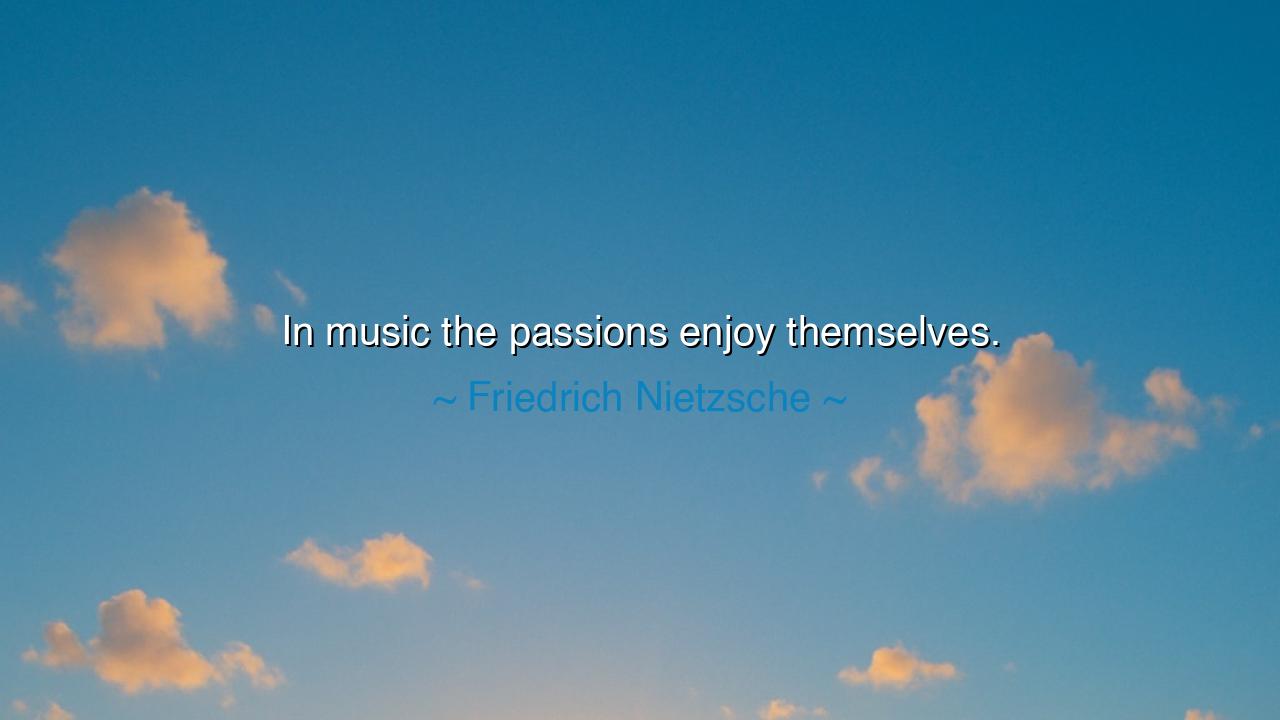
In music the passions enjoy themselves.






Hear the burning words of Friedrich Nietzsche, the philosopher who wrestled with gods and shadows, who proclaimed: “In music the passions enjoy themselves.” In this utterance lies a truth as deep as the sea: that music is not mere sound, not mere pattern of notes, but the playground of the soul’s fiercest energies. Passion, when bound by reason, grows weary and repressed; but in music, it is freed, and in freedom it rejoices. Music is the sanctuary where love, rage, sorrow, and joy dance unchained, each finding voice without shame.
The first wisdom in this saying lies in the bond between music and passion. For passion is wild, unruly, often feared by men who seek order and control. Yet music gives passion form without chains—allowing it to express, to rise, to fall, to expand beyond the limits of words. When one listens to a symphony, it is not the intellect that rejoices, but the passions themselves—anger in the clash of drums, longing in the swell of strings, triumph in the blazing horns. In music, the passions find not suppression, but play.
Nietzsche himself was not only a thinker but also a composer. He lived in an age haunted by Wagner, whose music filled Europe with mythic storms and waves of emotion. Nietzsche saw in Wagner’s operas the very embodiment of his phrase: passions leaping from the stage, taking pleasure in their own intensity, unashamed of their grandeur. Later he would break with Wagner, accusing him of excess, but the insight remained—music is the domain where passions, freed from moral judgment, delight in their own power.
History offers shining proof of this. Consider Beethoven, who, in his Fifth Symphony, gave sound to struggle itself. The famous four notes strike like Fate knocking at the door—terror and defiance embodied in sound. Yet in the unfolding symphony, struggle transforms into triumph. Here the passions do not hide—they roar, they battle, they exult. And generations, hearing it, have felt their own hidden fires awaken, as if their passions too were rejoicing in the music’s victory.
The second wisdom is this: passions, when denied, may destroy; but when expressed through art, they uplift. A heart filled with rage may fall into violence, but a heart that pours rage into song creates beauty. A soul drowning in sorrow may despair, but a soul that gives sorrow to melody creates healing for itself and others. Thus, music becomes the crucible where the raw ores of passion are transformed into treasures of spirit.
The lesson for us is clear: do not fear your passions. Do not silence love, nor rage, nor grief, nor joy. Let them live, let them breathe, and when they grow too strong for words, give them to music. Sing, play, or listen, and let the hidden energies of your soul find their playground. For in music, passion is not a burden—it becomes delight, and the soul learns to rejoice even in its storms.
Practical wisdom follows: make music a companion in your journey. When you are joyful, let music lift you higher. When you are broken, let music carry your sorrow. When you are angry, let music thunder with you. And when you are lost, let music remind you that your passions are not your enemy, but your strength. In this way, you will live not as a divided being, but as one who unites passion and art into harmony.
Thus remember Nietzsche’s words: “In music the passions enjoy themselves.” Let them echo in your heart as a reminder that passion, though fierce, is not evil, but divine. For music does not silence the storm within—it teaches it to dance, and in that dance, the soul discovers its joy.






AAdministratorAdministrator
Welcome, honored guests. Please leave a comment, we will respond soon